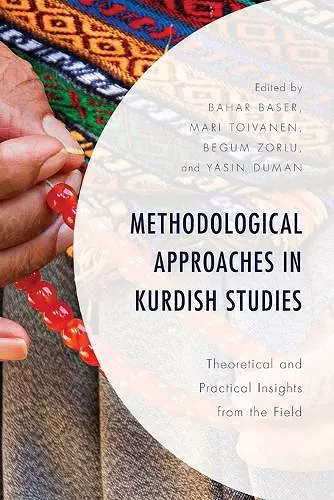Methodological Approaches in Kurdish Studies
Theoretical and Practical Insights from the Field
Bahar Baser editor Mari Toivanen editor Begum Zorlu editor Yasin Duman editor
Format:Paperback
Publisher:Bloomsbury Publishing PLC
Published:15th Aug '23
Currently unavailable, and unfortunately no date known when it will be back

This edited volume presents thirteen contributions that reflect upon the practical, ethical, theoretical and methodological challenges that researchers face when conducting fieldwork in settings that are characterized with deteriorating security situations, increasing state control and conflicting inter-ethnic relations. More precisely, they shed light to the intricacies of conducting fieldwork on highly politicized and sensitive topics in the region of Kurdistan in Iraq, Syria and Turkey as well as among Kurdish diaspora members in Europe.
This volume is multidisciplinary in its focus and approach. It includes contributions from scholars from various disciplinary backgrounds, ranging from sociology and political science to social psychology and anthropology. The complexity of security situations, and the atmospheres of distrust and suspicion have led the contributors to be creative and to adapt their research methods in ways that at times transcend disciplinary boundaries and conventions. Relatedly, the contributions also open the often-considered Pandora’s box of discussing the failures in what is often a “messy” research field, and how to adopt one’s methods to rapidly changing political circumstances. This necessitates greater reflexivity in existing power relations of the surrounding context and how those affect not only the interaction situations between the researcher and the participants, but also raise questions for the overall research process, concerning namely social justice, representation and knowledge production. The contributions unravel this by unpacking positionalities beyond ethnicities, discussing how gendered and other positionalities are constructed in fieldwork interactions and by illustrating how the surrounding structures of power and dominance are present in every-day fieldwork.
What differentiates this book from the existing literature is that it is the first academic endeavor that solely focuses on methodological reflections aimed to the field of Kurdish Studies. It offers a comprehensive and multidisciplinary account of scholars’ fieldwork experiences in the Kurdish regions and as such, it is also of value to scholars conducting or about to conduct fieldwork in conflict regions elsewhere.
This book is a timely and much-needed contribution to the growing literature on methodological and ethical challenges involved in conducting research in conflict settings. With a wide range of outstanding contributions from leading scholars, the volume fills an important gap on how ethnographic knowledge is primarily shaped by power relations. It serves as a stark reminder of the need to go beyond a standardized, one-size-fits-all approach to studying complex conflict environments. It is a vital resource for students and scholars of Kurdish studies, Middle Eastern studies, and those interested in conducting research in conflict zones. -- Mehmet Gurses, Florida Atlantic University
Methodological Approaches in Kurdish Studies: Theoretical and Practical Insights from the Field is not only a must read for those interested in Kurdish Studies, but is a reference book for doing research in politically sensitive and unstable contexts. Contributors from various social science disciplines present objective and creative methodologies spanning from ethnographic to archival data. It is the first book in Kurdish Studies on the practical, ethical, theoretical, epistemological, and methodological challengesresearchers face and the innovative solutions they come up with while working in and about the “stateless” Kurds in Turkey, Syria, Iraq and diaspora. -- Ayse Betül Çelik, Sabanci University
This massive volume not only opens new methodological, theoretical and epistemological avenues in the Kurdish studies, but also questions the very meaning of producing social sciences on the “risky” topics of the 21st Century. -- Hamit Bozarslan, École des Hautes Études en Sciences Sociales
For understandable reasons, the field of Kurdish Studies has long been dominated by an overt focus on the politics of the Kurdish Question and Kurdish identity. This has, however, resulted in the neglect of other important areas that merit scholarly attention. For some time, Kurdish studies has lacked self-reflective, critical research on the practice and politics of knowledge production within this field. This well-written edited volume, the first of its kind, makes a timely contribution to our understanding of the practical, methodological and epistemological challenges faced by scholars of Kurdish Studies. -- Welat Zeydanlioglu, Kurdish Studies Network
ISBN: 9781498575232
Dimensions: 229mm x 154mm x 22mm
Weight: 440g
282 pages